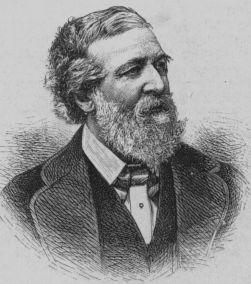Robert Browning Quotes
"Saul", vi.
Dramatic Romances and Lyrics (1845)
Part 1.
Paracelsus (1835)
Book the First
Sordello (1840)
“But little do or can the best of us:
That little is achieved through Liberty.”
Why I am a Liberal.
Bartlett's Familiar Quotations, 10th ed. (1919)
Cleon.
Bartlett's Familiar Quotations, 10th ed. (1919)
“The body sprang
At once to the height, and stayed; but the soul,—no!”
A Death in the Desert (1864)
“The heavens and earth stay as they were; my heart
Beats as it beat: the truth remains the truth.”
Valence, in Act IV.
Colombe's Birthday (1844)
Old Pictures in Florence, xvii.
Bartlett's Familiar Quotations, 10th ed. (1919)
“Wanting is—what?
Summer redundant,
Blueness abundant,
Where is the blot?”
Wanting—is what?
Bartlett's Familiar Quotations, 10th ed. (1919)
“Lost, lost! one moment knelled the woe of years.”
Childe Roland to the dark Tower came, xxxiii.
Bartlett's Familiar Quotations, 10th ed. (1919)
“There is no truer truth obtainable
By Man than comes of music.”
Charles Avison.
Bartlett's Familiar Quotations, 10th ed. (1919)
“God is the perfect poet,
Who in his person acts his own creations.”
Part 2.
Paracelsus (1835)
“Thy rare gold ring of verse (the poet praised)
Linking our England to his Italy.”
Book XII: The Book and the Ring, line 873.
The Ring and the Book (1868-69)
“Fail I alone, in words and deeds?
Why, all men strive and who succeeds?”
"The Last Ride Together", line 67 (1859).
Source: Dramatis Personae (1864), Rabbi Ben Ezra, Line 157.
“When the liquor's out, why clink the cannikin?”
The Flight of the Duchess, xvi.
Bartlett's Familiar Quotations, 10th ed. (1919)
“Tis not what man Does which exalts him, but what man Would do!”
"Saul", xviii.
Dramatic Romances and Lyrics (1845)
“You should not take a fellow eight years old
And make him swear to never kiss the girls.”
"Fra Lippo Lippi", line 224.
Men and Women (1855)
“Look not thou down but up!
To uses of a cup.”
Source: Dramatis Personae (1864), Rabbi Ben Ezra, Line 175.
“Can we love but on condition that the thing we love must die?”
La Saisiaz.
Bartlett's Familiar Quotations, 10th ed. (1919)
Sometimes ascribed to Robert Browning, this is in fact a misquotation from Robert Burton's The Anatomy of Melancholy (1621): "They [i.e. ambitious men] may not cease, but as a dog in a wheel, a bird in a cage, or a squirrel in a chain, so Budaeus compares them; they climb and climb still, with much labour, but never make an end, never at the top".
Misattributed
“The sprinkled isles,
Lily on lily, that o'erlace the sea.”
Cleon.
Bartlett's Familiar Quotations, 10th ed. (1919)
“That great brow
And the spirit-small hand propping it.”
By the Fireside, xxiii.
Bartlett's Familiar Quotations, 10th ed. (1919)
“In the morning of the world,
When earth was nigher heaven than now.”
Part III.
Pippa Passes (1841)
A Death in the Desert (1864)
“Sky—what a scowl of cloud
Till, near and far,
Ray on ray split the shroud:
Splendid, a star!”
The two Poets of Croisic.
Bartlett's Familiar Quotations, 10th ed. (1919)
“I judge people by what they might be,—not are, nor will be.”
A Soul's Tragedy (1846), Act ii.
The Statue and the Bust.
Bartlett's Familiar Quotations, 10th ed. (1919)
“The lie was dead
And damned, and truth stood up instead.”
Bells and Pomegranates No. III: Dramatic Lyrics: Count Gismond (1842), xiii.
Memorabilia, i.
Bartlett's Familiar Quotations, 10th ed. (1919)
“What of soul was left, I wonder, when the kissing had to stop?”
"A Toccata of Galuppi's", line 42.
Men and Women (1855)
“Progress is
The law of life: man is not Man as yet.”
Part 5.
Paracelsus (1835)
“Only I discern
Infinite passion, and the pain
Of finite hearts that yearn.”
Two in the Campagna, xii.
Bartlett's Familiar Quotations, 10th ed. (1919)
“Was never evening yet
But seemed far beautifuller than its day.”
Book VII: Pompilia, line 357.
The Ring and the Book (1868-69)
“God's justice, tardy though it prove perchance,
Rests never on the track until it reach”
Cenciaja.
Bartlett's Familiar Quotations, 10th ed. (1919)
Bartlett's Familiar Quotations, 10th ed. (1919)
